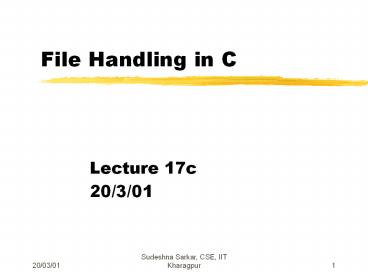File Handling in C - PowerPoint PPT Presentation
Title:
File Handling in C
Description:
main can take two arguments conventionally called argc and argv. ... regarding command line arguments are passed to the program through argc and argv. ... – PowerPoint PPT presentation
Number of Views:1986
Avg rating:3.0/5.0
Title: File Handling in C
1
File Handling in C
- Lecture 17c
- 20/3/01
2
Introduction
- Files are places where data can be stored
permanently. - Some programs expect the same set of data to be
fed as input every time it is run. - Cumbersome.
- Better if the data are kept in a file, and the
program reads from the file. - Programs generating large volumes of output.
- Difficult to view on the screen.
- Better to store them in a file for later viewing/
processing
3
Basic File Operations
- Opening a file
- Reading data from a file
- Writing data to a file
- Closing a file
4
Opening a File
- A file must be opened before it can be used.
- FILE fp
- fp fopen (filename, mode)
- fp is declared as a pointer to the data type
FILE. - filename is a string - specifies the name of the
file. - fopen returns a pointer to the file which is used
in all subsequent file operations. - mode is a string which specifies the purpose of
opening the file - r open the file for reading only
- w open the file for writing only
- a open the file for appending data to it
5
Contd.
- Points to note
- Several files may be opened at the same time.
- For the w and a modes, if the named file does
not exist, it is automatically created. - For the w mode, if the named file exists, its
contents will be overwritten.
6
Examples
- FILE in, out
- in fopen (mydata.dat, r)
- out fopen (result.dat, w)
- FILE empl
- char filename25
- scanf (s, filename)
- empl fopen (filename, r)
7
Closing a File
- After all operations on a file have been
completed, it must be closed. - Ensures that all file data stored in memory
buffers are properly written to the file. - General format fclose (file_pointer)
- FILE xyz
- xyz fopen (test, w)
- .
- fclose (xyz)
8
Read/Write Operations on Files
- The simplest file input-output (I/O) function are
getc and putc. - getc is used to read a character from a file and
return it. - char ch FILE fp
- ..
- ch getc (fp)
- getc will return an end-of-file marker EOF, when
the end of the file has been reached. - putc is used to write a character to a file.
- char ch FILE fp
- putc (c, fp)
9
Example convert a text file to all UPPERCASE
main() FILE in, out char c
in fopen (infile.dat, r) out
fopen (outfile.dat, w) while
((c getc (in)) ! EOF) putc (toupper
(c), out) fclose (in) fclose (out)
10
Contd.
- We can also use the file versions of scanf and
printf, called fscanf and fprintf. - General format
- fscanf (file_pointer, control_string, list)
- fprintf (file_pointer, control_string, list)
- Examples
- fscanf (fp, d s f, roll, dept_code, cgpa)
- fprintf (out, \nThe result is d, xyz)
11
Some Points
- How to check EOF condition when using fscanf?
- Use the function feof
- if (feof (fp))
- printf (\n Reached end of file)
- How to check successful open?
- For opening in r mode, the file must exist.
- if (fp NULL)
- printf (\n Unable to open file)
12
Example
typedef struct int roll
char dept_code6 float
cgpa STUD main() FILE stud
STUD s float sum 0.0 int count
0 stud fopen (stud.dat, r)
while (1) if (feof (stud))
break fscanf (stud, d s f,
s.roll, s.dept_code,
s.cgpa) count sum
s.cgpa printf (\nThe average cgpa is
f,
sum/count) fclose (stud)
13
Arguments to main ()
- Command line arguments are parameters supplied to
a program, when the program is invoked. - cc myfile.c
- cc xyz.c -lm
- netscape www.mailcity.com
- average 10 20 30 40 50
- How do these parameters get into the program?
- Every C program has a main function.
- main can take two arguments conventionally called
argc and argv. - Information regarding command line arguments are
passed to the program through argc and argv.
14
Echoing the command line arguments
- int main (int argc, char argv)
- int i
- printf (argc d\n, argc)
- for (i0 iltargc i)
- printf (argvd s\n,
-
i,argvi) - return 0
a.out how many argc 3 argv0 a.out argv1
how argv2 many
15
Example convert a text file to all
UPPERCASE, using command line arguments
main (int argc, char argv FILE
in, out char c in fopen
(argv1, r) out fopen (argv2,
w) while ((c getc (in)) ! EOF)
putc (toupper (c), out) fclose
(in) fclose (out)
Run this program as a.out old new































